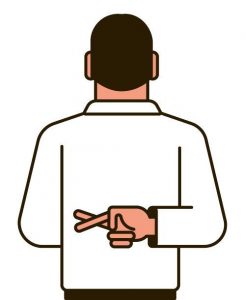 Commonly called a “lie detector”, the polygraph machine actually measure certain physiological factors such as blood pressure, respiration, and pulse rate. The work on the premise that if you’re lying you’re going to be nervous and exhibit the physical signs of it such as a more rapid heart rate, increased respiration, and a rise in blood pressure. But are these surefire signs of prevarication? I don’t think so, not necessarily.
Commonly called a “lie detector”, the polygraph machine actually measure certain physiological factors such as blood pressure, respiration, and pulse rate. The work on the premise that if you’re lying you’re going to be nervous and exhibit the physical signs of it such as a more rapid heart rate, increased respiration, and a rise in blood pressure. But are these surefire signs of prevarication? I don’t think so, not necessarily.
Nigel Harber, writing for Psychology Today writes, “There has been a lot of controversy about whether lie detectors work. Some experts claimed that a high proportion of persons who “failed” the polygraph subsequently confessed to crimes. On the other hand, the test generates a lot of false positives, i.e., people who are telling the truth but whose polygraph test suggests they are lying.
Whereas the American Polygraph Association claims accuracy rates of over 90 percent, leading critics, such as David Lykken put the polygraph accuracy rate at around 65 percent that is only slightly better than the 50 percent correct one would get by flipping a coin.
Interestingly, the polygraph is quite good at identifying liars but does no better than chance at detecting honest people according to Lykken. In other words, there is a 50:50 chance that a polygraph test will say an honest person is lying (a 50 percent “false positive” rate).
It is bad enough that polygraph tests are so indirect, prompting some researchers to look for more direct evidence of lying through analysis of brain scans. Another major weakness is that the test can be faked.
In the normal administration of the test, technicians rely upon responses that they know to be true to provide a baseline against which deceptive answers can be judged as an increase in nervous arousal. One of the most effective means of faking the test is to enhance arousal accompanying honest answers so that it is difficult to detect increased arousal theoretically accompanying lies.
In 1998, the U.S. Supreme court acted to restrict their use in legal proceedings. In particular, defense attorneys can no longer use evidence that their client passed a polygraph test as establishing innocence of a crime.
Even as the polygraph test is discredited in legal proceedings, its use also declined in other settings and most employers are legally barred from using it as a technique to recruit honest employees. The government is one exception.
From a scientific perspective, there is no rationale for administering a polygraph test. So there is certainly no good reason to take one – if you can avoid it. Otherwise, you expose yourself to the nightmare of false self-incrimination.”
The last point Dr. Harber makes is an important one.
